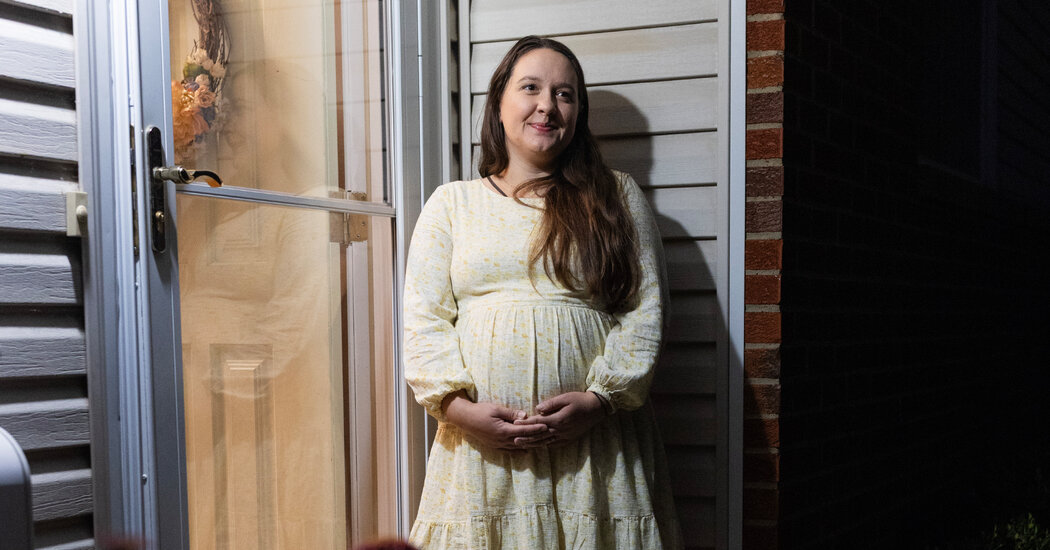Copyright The New York Times

Samantha Kopy logged onto a video call at 8 p.m. on a Tuesday to teach the secret language of the menstrual cycle. “We don’t have a crystal ball. We can’t know exactly when we are going to ovulate,” Mrs. Kopy said to the young, Christian couples on her computer screen. “So we go off the signs and symptoms of our body.” Six people stared back at Mrs. Kopy from living rooms across America — ready to learn how to prevent pregnancy without using birth control. The women in the group had a few different options, Mrs. Kopy explained. They could test their urine for a particular hormone, or take their temperature each morning as soon as they woke up. The most diligent among them might consider their cervical mucus, Mrs. Kopy added, advising them to “lift it up between your pointer and your thumb.” If it’s clear and slippery, she said, that’s a sign of fertility. Probably a night to abstain. Since the birth control pill gained widespread acceptance in the 1960s and 1970s, mainstream political voices have rarely expressed opposition to the medication celebrated for giving women more control over their reproductive lives. For decades, only certain traditional Catholic and Christian circles publicly rejected the pill and other forms of contraception, believing that some methods came too close to abortion, or that the act of intercourse should always have the potential to bring about new life. But a practice known as “fertility awareness” or “natural family planning” — originally devised over 50 years ago by doctors with ties to the Catholic church — is now gaining support among a broader group of social conservatives and adherents of Health Secretary Robert F. Kennedy Jr.’s Make America Healthy Again, or MAHA, movement. The rising interest comes as many prominent conservatives are encouraging women to abandon birth control pills and other forms of hormonal contraceptives. Officials in the Trump administration have also been exploring ways for the federal government to direct funding toward teaching more women of reproductive age to accurately identify their fertile windows, according to three people with knowledge of the discussions. And though much of the work is framed as part of the administration’s broader effort to combat infertility, many conservatives hope the new emphasis on fertility awareness will also inspire women seeking to prevent pregnancy to stop taking birth control. Fertility-awareness-based methods are distinct from the unreliable “rhythm method,” which relies only on the date of a woman’s last menstrual period to predict when she is fertile — hinging instead on physical signals of fertility. They can also be used to help identify underlying reproductive health conditions. In a potential sign of the administration’s priorities, the Department of Health and Human Services last month laid off almost the entire office that administers Title X, the nearly $300 million government program providing birth control and other family planning services to 2.8 million low-income patients a year. The move was widely viewed as part of a larger push to eliminate what President Trump has called “Democrat programs” during the government shutdown. Emily Hilliard, a health department spokeswoman, said in an email that those initiatives would continue, along with efforts related to fertility-awareness-based methods, which had been handled by the same division. The health department did not provide further comment. Some conservative leaders have warned that women are harmed by hormonal birth control methods like IUDs and the pill, which essentially trick the body into thinking it is pregnant by altering hormone levels. They say the medication transforms a woman’s personality, affects her future fertility and changes the kind of man she is attracted to, claims that “have no basis in clinical data,” according to the American College of Obstetricians and Gynecologists. Influencers in the MAHA movement, in particular, are promoting cycle-charting as a “natural” and “holistic” alternative, in which women are empowered to stop suppressing their menstrual cycles and to take control of their bodies — a message that has also been embraced by some on the left. “It’s not very feminist to think that women are too stupid to know how our cycles work and be able to avoid pregnancy naturally,” said Alex Clark, a prominent MAHA podcaster who has called hormonal birth control “poison." Casey Means, Mr. Trump’s nominee for surgeon general and another major figure in the MAHA movement, has said that the widespread use of hormonal birth control signals a “disrespect of life.” “Having these hormonal cycles is part and parcel with our health in every possible way, and also with the miracle of creating life,” she said in an interview with Tucker Carlson last year. With birth control, she added, “we just shut it down.” Fertility-awareness-based methods are about 77 percent effective, according to ACOG, a relatively low number that proponents attribute to couples choosing to have unprotected sex during a woman’s fertile window, despite knowing the risks. Some experts fear that an increased focus on fertility awareness will result in more unwanted pregnancies. Natural family planning methods require a level of diligence and discipline that make even birth control critics reluctant to recommend them as a replacement. “I would never recommend it to my teenager,” said Sarah Hill, a social psychologist who wrote a book on hormonal birth control, in which she argues that birth control side effects are more far-reaching than is widely understood. “We are very fallible, and most people are not really in touch with how fallible they are,” she added. The Push for a Cultural Shift When Dr. Marguerite Duane proposed an official course on fertility-awareness-based methods as an adjunct professor at Georgetown Medical School in 2017, the university administration shot her down, she said. The school’s Committee on Medical Education, she recalled, initially informed her that there was “no evidence behind these methods.” But the natural family planning effort never took off during Mr. Trump’s first term. “There wasn’t enough money, and there weren’t enough people trained to teach the methods,” said Dr. Duane, now a professor at Duquesne University and the executive director of Facts About Fertility, an educational organization focused on fertility awareness. Now, some in the health department are trying to fix those problems, seeking input from Dr. Duane and others. The administration recently signaled its plans to expand fertility awareness programs at government clinics providing contraception — a goal outlined in Project 2025, the blueprint for Mr. Trump’s presidency prepared by the conservative Heritage Foundation. Federal health officials have been soliciting ideas for easy curriculums that can be used to quickly train a large number of Title X clinic staff members on cycle-charting methods, according to a person with knowledge of the discussions. Many natural family planning advocates are hoping that the shift toward these methods will be cultural, driven by women themselves, rather than government policy. According to a recent study from KFF, a health policy research group, 14 percent of women between 18 and 25 said they had made a change or had thought about making a change to their birth control because of something on social media. After Melanie Davis first read about the potential benefits of charting her menstrual cycle, without hormonal birth control, the 33-year-old graphic designer was intrigued. One of her favorite bloggers had been writing about “seed cycling,” the practice of eating different kinds of seeds at various stages in the menstrual cycle to maximize health benefits. “I thought, is this woo woo, or is this real?” said Ms. Davis, who lives in North Carolina with her husband and two young children. “But I really trusted her blog.” Ms. Davis had long harbored questions about hormonal birth control, which she had taken for 15 years, and loved the idea of better understanding her natural menstrual cycle. She is now enrolled in a class with a fertility awareness instructor, trying to avoid pregnancy without birth control until she feels ready to have a third child. “I know mentally today I feel better not putting something artificial in my body all the time,” she said. A proliferation of cycle-charting apps is also contributing to increased interest in fertility awareness. Some apps ask only for the date of a woman’s last period, an ineffective way to predict a woman’s fertile window. Others go much further, prompting users to share a trove of personal information that helps track their cycles, including details on body temperature, vaginal discharge and sex drive. These apps — some of which have proven vulnerable to data breaches — often encourage women to embrace their natural bodies and an “empowering” lifestyle that is “100% hormone-free,” mirroring the language of MAHA influencers. One app, 28, backed by funding from the conservative venture capitalist Peter Thiel, features images of bikini-clad models emerging from tropical waterfalls. The program recommends a diet and exercise plan for each phase and day in a user’s cycle. During the follicular phase — before ovulation — the app tells women that they have “butterfly energy,” and recommends fermented vegetables to help rebuild good bacteria, along with a “flow-based” workout to achieve “slim thighs and booty.” “It’s very, very difficult to do if you have pretty flippant reasons for avoiding pregnancy — just like, ‘Oh, we kind of want to travel,’ or, ‘We’d like to save for a better car,’” said Mrs. Kopy, acknowledging that couples have to actively abstain from sex during the window when they are most attracted to each other. But because Catholics are called to be generous toward life, she said, that challenge can be a “beautiful thing.” If you find yourself struggling to abstain, she told the class, that could be a sign that it is time for a baby.



